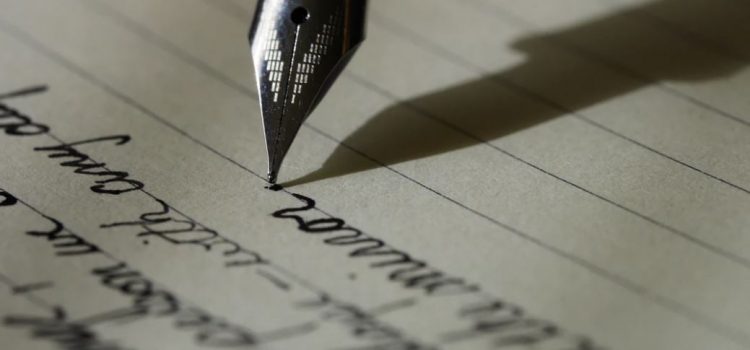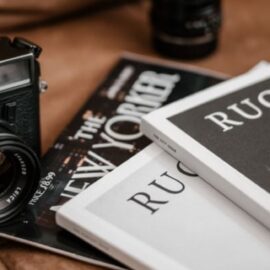

This article gives you a glimpse of what you can learn with Shortform. Shortform has the world’s best guides to 1000+ nonfiction books, plus other resources to help you accelerate your learning.
Want to learn faster and get smarter? Sign up for a free trial here .
Do you have writer’s block? Do you want to improve your writing skills?
Whether you’re writing a novel, advertisements, or an essay for class, good writing skills will come in handy. Thankfully, these skills can be learned through practice, perseverance, and a good book.
Below, we’ve listed thirteen essential books that every writer should read to improve their skills.
Must-Have Books for Writers to Better Their Skills
No matter what job you have, everybody writes. Writing is an important skill set used to communicate your ideas and get your point across. There’s always room to improve your writing skills, whether you’re a beginner or a professional.
Here are our favorite books to help you improve your writing.
On Writing is Stephen King’s musings on his craft—about how he discovered writing, what he learned about it, and his advice to you as a writer. Part memoir and part practical advice, it’s a personal look at one of the bestselling authors of all time.
Learn how Stephen King got his start by writing as a teenager, then struggled as an early writer until his breakthrough book Carrie. Then learn his key tips on writing good fiction, including how to develop a realistic story and characters, why you must avoid adverbs, and how to make it in the writing business.
No matter your current skill level, William Zinsser believes anyone can practice the craft of writing. On Writing Well offers a back-to-basics approach, focusing on honing essential writing skills rather than trying to employ complex stylistic techniques. Even if you’re not a professional writer, you’ll often find yourself in a position where you need to express an idea with words, and whether you’re crafting an email or a resume, you can apply Zinsser’s principles of simple, clear, and engaging writing. This book explores how to approach the discipline of writing and effectively put your ideas into words.
In this book, Zinsser explores his principles of simplicity, clarity, and identity, how to achieve each of them, and the specific challenges of creative nonfiction genres.
Are you naturally a bad writer? Trick question: There’s no such thing. In Everybody Writes, bestselling author, speaker, and digital marketer Ann Handley explains that writing is a practice, not a talent, and that anyone can improve their writing through consistent work and practice. You don’t need to be a Hemingway or a Faulkner to produce great content: You just need a routine, a process, and a voice—plus something to write with!
Whether you’re emailing your colleagues at work, posting on social media, writing papers for school, or writing content for marketing, Handley offers a comprehensive guide to improving your writing and reaching your audience.
Are you an academic or non-fiction writer? Have you ever sat in front of a blank screen and struggled to write a paper? In How to Take Smart Notes, researcher Sönke Ahrens argues that this happens because traditional, prewriting note-taking methods don’t work—and that you can avoid this issue by using the slip-box system: a method of taking notes and organizing them that fosters the creation and publication of original ideas.
In this book, you’ll learn how to use the slip-box system effectively and why it’s better than traditional note-taking methods.
How to Read Literature Like a Professor
Improving your writing isn’t just about grammar and rules—reading is one of the best ways to become a better writer.
How to Read Literature Like a Professor by Thomas C. Foster is a crash course in the art of reading intelligently. In this book, you’ll learn how to identify common literary conventions and gain the skills necessary to analyze them as a professor would.
In this book, you’ll also discover why Goose had to die in Top Gun and why sex scenes aren’t always about sex in literature.
When you read a book, do you find yourself forgetting what you read? Do you regret wasting time on books that you should have skimmed instead?
If you read a lot of books a year, then it makes sense to spend a few hours learning how to read better and double the value from your reading. That’s the point of How to Read a Book, a classic by Mortimer Adler and Charles Van Doren.
The argument is compelling: after you learn phonics as a child and go through high school English, no one really teaches you how to read intelligently. College courses rarely touch on this, and the workforce even less so.
As a result, plenty of adults read at an elementary level – not in the sense of having a limited vocabulary, but in absorbing the value of a book efficiently. See if any of these problems apply to you:
- You don’t really know what a book is about until you start reading it.
- You read at the same pace, regardless of whether it’s a good book or a terrible book.
- You don’t critique your books, articulating exactly why you liked or disliked them.
In How to Read a Book, you’ll learn:
- Tactics to understand what a book is about, in minutes
- How you should read a novel differently from a nonfiction book
- How to intelligently critique a book
- The highest possible level of reading
Have you ever tried to communicate a point you think is important, only to find that the other person isn’t getting it? Joel Schwartzberg says it’s a common experience that comes from not actually knowing the point you’re trying to make.
In Get to the Point!, Schwartzberg argues that anyone can make a point that leads to action or change—you just have to know what your point is and how to convey it effectively. Whether you’re trying to convince a friend to watch your favorite show or pitching your boss on a new idea, you must first have a point, then know how to market it to compel others to action.
In this book, Schwartzberg gives you the tools that can help you identify, craft, and communicate your point so it resonates with your audience and he’ll explain how to apply your point in a range of settings and scenarios.
The ultimate goal of copywriting is to craft advertisements that spur demand for what you’re selling. You do this by understanding what customers already need and framing your product as the only solution to fulfill these needs.
In the best-selling classic Breakthrough Advertising, renowned copywriter Eugene M. Schwartz offers timeless advice for crafting persuasive advertisements that convince customers to buy your products.
This book walks you through Schwartz’s methods for writing advertisements that sell. You’ll come away knowing:
- Exactly what you need to understand about customers to craft successful advertisements
- Specific techniques you can use to create captivating headlines
- Persuasive methods you can apply to write compelling copy
How to Become a Straight-A Student
Getting good grades in college opens up your world: It can help you get into better graduate schools and even get better jobs. But how do you do well in college? Most students assume they must study endlessly to do well. However, in How to Become a Straight-A Student, professor and productivity expert Cal Newport argues that there’s a better way: With the right study techniques, you can ace your college courses with just a few hours of studying each day.
In this book, Newport shares those study techniques. You’ll learn how to plan your day effectively, combat procrastination, ace all your exams, and write fantastic papers.
If you’ve ever felt a creative tug or impulse, writer Elizabeth Gilbert can help you act on it. According to Gilbert, the author of the best-selling memoir Eat Pray Love, creativity is not just the domain of a few brilliant professional artists, but rather an enriching way of life that anyone can adopt at any time. If you embrace creativity, you’ll experience “Big Magic”: a mystical or spiritual force of creativity that brings joy and purpose.
In this book, you’ll learn how, according to Gilbert, you can commune with the forces of creativity and establish an enjoyable, rewarding creative practice that can last a lifetime.
The Bullet Journal Method is a comprehensive guide to using the Bullet Journal Method: a single-notebook productivity system he designed to help himself and others add structure to their lives through comprehensive planning of and reflection on tasks and events. Carroll explains how to extend the method beyond productivity to a practice in mindfulness and intentionality, providing not only step-by-step instructions for how to begin your own Bullet Journal but also information on how to maintain a journaling practice that can arguably improve your overall quality of life.
To be a better writer, you need to get into a “flow” state of mind that is void of anxiety about outside problems. Although we live longer today and have more material wealth than ever, many people feel anxious rather than happy. In Flow, psychologist Mihaly Csikszentmihalyi offers an antidote. People are happiest when they feel in control of their inner thoughts and feelings and experience a “flow state”: a sense of enjoyment, purpose, and meaning. In this book, Csikszentmihalyi explains:
- How controlling and ordering your consciousness brings flow and enjoyment
- Which personality characteristics produce flow
- Which activities produce flow
- How to find flow in your work and relationships by writing
Most people communicate from their own perspective, but great communication comes from understanding and connecting with other people. Written by communication expert Jay Sullivan, Simply Said is a blueprint for effective business communication. Top-notch communication skills are essential to success in any professional field—after all, you can only get clients, colleagues, and audiences to buy into your ideas if you’re able to communicate them clearly.
Sullivan argues that you can deliver a clear and compelling message by focusing on what others hope to get from the exchange and communicating in a way that serves them.
In this book, Sullivan advises how to:
- Create and deliver memorable presentations
- Write documents and emails that people will actually read
- Navigate communication in specific business scenarios
Final Words
Advice writers often get to improve their work is to read more, and there’s nothing more true. By reading more books penned by experienced and talented writers, you’re one step closer to getting on their level.
Did we miss any of the best books to improve writing skills? If so, leave your suggestions in the comments below!

Want to fast-track your learning? With Shortform, you’ll gain insights you won't find anywhere else .
Here's what you’ll get when you sign up for Shortform :
- Complicated ideas explained in simple and concise ways
- Smart analysis that connects what you’re reading to other key concepts
- Writing with zero fluff because we know how important your time is






